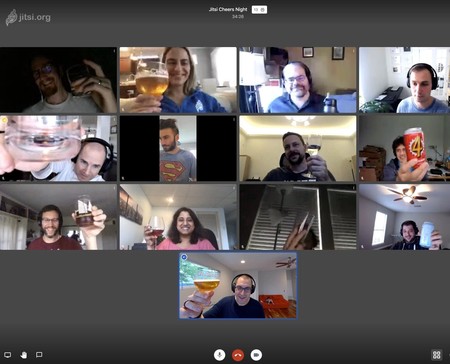
The health crisis caused by the pandemic coronavirus has forced us to adopt new habits. The way we work has changed almost in all areas, we relate differently to be able to maintain the necessary detachment physical, we use new technological solutions… and these changes have also come to the policy. Especially the appearances and press conferences, which are now carried out electronically in empty rooms.
Have been given of what to talk about in Spain is that daily calls for the Government in the Palace of la Moncloa to different positions in the administration, ministers and even the president of the Executive to give account of the latest data and announcements in connection with the COVID-19.

And have given that talk because, until a few days ago, the journalists had to submit questions through a group of WhatsApp managed by the Secretariat of State of Communication and does not live through any technological solution, as yes, it was happening at press conferences and telematics of the opposition partiesthat have been using Zoom.
Jitsi Meet, the solution for organizing press conferences with the journalists
Since this Monday, everything has changed. Bowing to the criticism, the Moncloa allows the formulation of questions live via a video conferencing system in the appearances of the ministers and the president.
On the one hand, the usual means organise themselves to articulate the five shifts available in each appearance. On the other, as explains and demonstrates by means of a video the journal.it isand the media is not usual to attend to through another application of video conferencing, Jitsi Meet, the draw of the other five shifts of the question that makes the Secreatría State of Communication using the random number generator from Google.
 Recording of the draw of rounds of trivia questions published in ‘the journal.is’.
Recording of the draw of rounds of trivia questions published in ‘the journal.is’. Subsequently, all the journalists that have been assigned a shift of the word are invited to a system of Government by which they formulate their questions in direct, seeing his image in the press room of the Palacio de la Moncloa as in the tv signal being distributed.
But… how is Jitsi Meet? What is the difference from other similar applications? Where does it come from? What is a true alternative to Zoom, Skype, Hangouts…?
A practical solution to cross-platform open-source
Jitsi Meet is nothing more than a derivative of Jitsi, the project fathera set of projects of video conferencing applications, VoIP and instant messaging started its journey in 2003 as a student project by Emil Ivov.
Over the years, and the arrival of support for both private and institutional, it went from being a tool of experimentation to become a service maintained by BlueJimp, a company founded by Ivov which gave work to some of the main collaborators of the project. Today, the software company australian acquired BlueJimp in 2015, Atlassian, maintains the project and especially its derivatives, such as Jitsi Meet, with their distribution under the terms of Apache license and, therefore, being open-source.
 A recent meeting of the team of Jitsi.
A recent meeting of the team of Jitsi. The fundamental difference of Jitsi Meet with solutions that are extremely popular in the present as Zoom, beyond being free software, is that no need to install software or register on the service. We only need to access their web client through the browser and, if you use a mobile phone, have the ability to use the application for Android and iOS.
What about the encryption? As it happens something similar to the case of Zoom. Despite the fact that yes they are encrypted group video calls in a certain way, the encryption is not end-to-endserver , the bridge decrypts the information that is transmitted.
The difference with other solutions, however, is that Jitsi allows us to enable our own server, that does not mean that we can achieve an encryption of end-to-end, but I did keep under our direct control, the machine in which the data is decrypted. A solution that is not ideal, but yes you can provide us with a greater confidence. Despite all of this, from the project take time to work to improve the technology they use and that does not allow the E2E.
Looking also in privacy, it should be noted that in Jitsi use Google Analytics to evaluate the use of functions and possible errorsbut if we don’t generate too much confidence to the possibility that some of our data come to Mountain View, by petty that is, there is a code developed by a third party that allows you to turn off this option from the customer that enables our team as a server.
Another great attraction of Jitsi Meet is that it has no limit of users in terms of their video callsso that you can have as many participants as you want. Will depend, in any case, the connections that can withstand the server and the available bandwidth.
Finally, it should be noted that this solution allows you to enable video chat rooms or voice, both public and private; customize their names, addresses, access and appearance of the interface; and setting a phone number in order to access them by phone. In addition to all this, we have at our disposal an extension for Chromeoptions like text chat, smudge the background of the image from our camera, ask for the turn with the option that allows us to raise your hand virtually, or not to mute the speakers and even the possibility of knowing how much time has spoken to each one.
it was originally published in
Engadget
by
Toni Castillo
.
![]()









